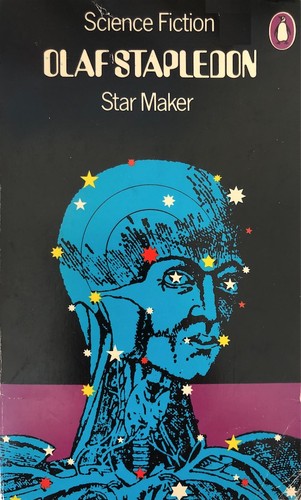Star maker.
By Olaf Stapledon
"Star maker." was published by Penguin in 1972 - Harmondsworth, it has 264 pages and the language of the book is English.
“Star maker.” Metadata:
- Title: Star maker.
- Author: Olaf Stapledon
- Language: English
- Number of Pages: 264
- Publisher: Penguin
- Publish Date: 1972
- Publish Location: Harmondsworth
“Star maker.” Subjects and Themes:
- Subjects: ➤ Fiction, general - Fiction in English - Science fiction - Fiction - Cosmology - Long Now Manual for Civilization - Fiction, science fiction, general - English literature - English Science fiction
Edition Specifications:
- Pagination: 264p. ;
Edition Identifiers:
- The Open Library ID: OL14948049M - OL3290739W
- Online Computer Library Center (OCLC) ID: 315747627
- ISBN-10: 0140101527
- All ISBNs: 0140101527
AI-generated Review of “Star maker.”:
Snippets and Summary:
One night when I had tasted bitterness I went out on to the hill.
... The sequence of events in the successfully waking world was generally more or less as follows. The starting point, it will be remembered, was a plight like that in which our own Earth now stands. The dialectic of the world's history had confronted the race with a problem with which the traditional mentality could never cope. The world-situation had grown too complex for lowly intelligences, and it demanded a degree of individual integrity in leaders and in led, such as was as yet possible only to a few minds. Consciousness had already been violently awakened out of the primitive trance into a state of excruciating individualism, of poignant but pitifully restricted self-awareness. And individualism, together with the traditional tribal spirit, now threatened to wreck the world. Only after a long-drawn agony of economic distress and maniac warfare, haunted by an increasingly clear vision of a happier world, could the second stage of waking be achieved. In most cases it was not achieved. "Human nature", or its equivalent in the many worlds, could not change itself; and the environment could not remake it. But in a few worlds the spirit reacted to its desperate plight with a miracle. Or, if the reader prefers, the environment miraculously refashioned the spirit. There occurred a widespread and almost sudden waking into a new lucidity of consciousness and a new integrity of will. To call this change miraculous is only to recognize that it could not have been scientifically predicted even from the fullest possible knowledge of "human nature" as manifested in the earlier age. To later generations, however, it appeared as no miracle but as a belated wakening from an almost miraculous stupor into plain sanity.
... The result of this extraordinary custom, of artificial fatherhood by "brute-men", which was carried on without remission in all countries for a generation, and in a less thorough manner for a very much longer period, was to alter the composition of the whole quasi-human race. In order to maintain continued adaptability to an ever-changing environment a race must at all costs preserve in itself its slight but potent salting of sensibility and originality. In this world the precious factor now became so diluted as to be ineffective. Henceforth the desperately complex problems of the world were consistently bungled. Civilization decayed. The race entered on a phase of what might be called pseudo-civilized barbarism, which was in essence sub-human and incapable of change. This state of affairs continued for some millions of years, but at last the race was destroyed by the ravages of a small rat-like animal against which it could devise no protection. ...In conclusion I will mention that in one or two of these quasi-human worlds a new and superior biological race emerged naturally during the typical world crisis, gained power by sheer intelligence and sympathy, took charge of the planet, persuaded the aborigines to cease breeding, peopled the whole planet with its own superior type, and created a human race which attained communal mentality, and rapidly advanced beyond the limits of our exploring and over- strained understanding. Before our contact failed, we were surprised to observe that, as the new species superseded the old and took over the vast political and economic activity of that world, it came to realize with laughter the futility of all this feverish and aimless living. Under our eyes the old order began to give place to a new and simpler order, in which the world was to be peopled by a small "aristocratic" population served by machines, freed alike from drudgery and luxury and intent on exploration of the cosmos and the mind.
Read “Star maker.”:
Read “Star maker.” by choosing from the options below.
Search for “Star maker.” downloads:
Visit our Downloads Search page to see if downloads are available.
Find “Star maker.” in Libraries Near You:
Read or borrow “Star maker.” from your local library.
- The WorldCat Libraries Catalog: Find a copy of “Star maker.” at a library near you.
Buy “Star maker.” online:
Shop for “Star maker.” on popular online marketplaces.
